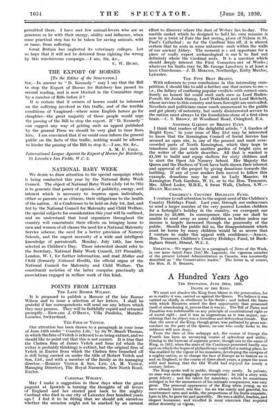A Hundred Years Ago
THE SPECTATOR, JUNE 26m, 1830. DEATH OF THE KENO.
We must not absolve the King from blame in the persecution, for so in reality it was, carried on against the Queen. We believe it was carried on chiefly in obedience to his desire ; and indeed the haste with which Ministers seized the first opportunity that presented itself of abandoning it, proves that it Was so. The Bill of Pains and Penalties was indefensible on any principle of constitutional right or of moral right ; and it was as ungenerous as it Was unjust, con- sidering that its object was a friendless and defenceless female. But that the error of the King, though great, was palliated by gross mis- conduct on the part of the Queen, no one who coolly looks to the evidence will now deny:
From the date of this unhappy act, the course of George the Fourth has been an unvarying course of splendour and utility. 'Co'ming to the exerciseof supreme power, though not to the name of King, in 1811, when the state of the Continent presented hardly one spot on which the hopes of philanthropy could find a resting-place, he was enabled by the vigour of his Measures, developing the energies of a mighty nation, so to change the face of Europe as to bestow on it and on England, in the course of three short years, a peace the most solid and lasting that the Old World had enjoyed for nearly a century before.
The King spoke well in public, though very rarely. In private, no man was more engagingly conversational : lie told a story _with great felicity ; and his talent for mimickry, which he sometimes indulged in for the amusement of his intimate companions, was very great. The personal appearance of the King when young, as we have already hinted, was fine : his air was manly and graceful, his countenance open and noble, the-proportions of his limbs exquisite. Late in life, he grew fat sful_miwieldy, lie,was a skilful, fearless and -elegant -horseman, and excelled Ili 'eiereises that reqUirecl
either dexterity or vigoar, - - - - • •


















































 Previous page
Previous page